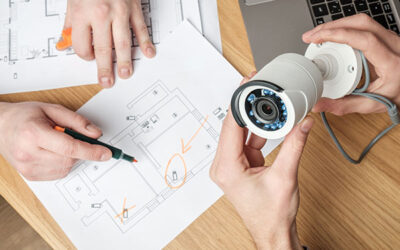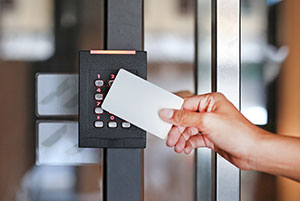There are various ways to approach your Home Security. There is so much on the market one can become overwhelmed in choices. When it comes to security in the home you do not want to sacrifice reliability for the cheapest option on the market.
If you are unfortunate to experience a break & enter you want peace of mind that your Security Alarm System is going to work the first time, every time. An alarm system activates on activity in the armed area. A standard home alarm system would comprise of any of the following devices:
- An alarm panel (the main brain of the system),
- A Code Pad (also known as a keypad) in which you put your 4 digit pin code into for arming and disarming. You can have multiple keypads throughout the house
- An internal screamer (so loud it deters the culprit from leaving the house as it is so loud)
- An external siren and blue strobe (to alert neighbors and patrol vehicle of your event)
- Motion detectors – that activate your alarm upon heat & movement. There is also the option to accommodate your stay-at-home pets of up to approx. 45k
- Reed switches – installed on windows or doors so if they are opened it triggers the alarm
- Glass break detectors – in case of a large window being smashed in
- 12v Smoke Detectors – to alert you by our control room or self-monitoring app should there be a fire whilst you are out of the home
- Panic or Medical Pendants – that can be worn on the person whilst at home. If you need assistance you press the button and our control room will alert the necessary services
- Key fobs – for ease of arming/disarming.
Let’s review the pros and cons of Hardwired Vs. Wireless Security Alarm Systems
The Benefits of Hardwired Alarm Systems
Having a hardwired alarm system allows the panel to respond almost immediately and you do not have the ongoing expense of replacing batteries. The hardwired alarm system draws power from your main AC circuit. If there is an AC power fail, the alarm reverts to its 12-24hr backup battery included in the system. This battery only needs to be replaced when it gets low. Depending on the quality of the battery and its usage over the year, you can get over 2 years or more longevity. We recommend a service each year to ensure all voltages are tested and detectors are tested to ensure no underlying issues. Hardwired Alarm Systems are ideal for homeowners and sites that have clear ceiling access to enable the cable to be run to all devices. Hardwired alarms offer keypads, motion detectors, reeds switches, sirens, smoke detectors, key fobs, glass breaks, & medical/panic buttons.
The Benefits of Wireless Alarm Systems
Wireless alarm systems are beneficial for those who are renting or have minimal ceiling cavity for running cabling. A wireless alarm system brings the next level of convenience to your doorstep. Keep in mind, there will be ongoing costs in replacing batteries in the sensors each year. A wireless alarm system takes a few moments to ‘wake up’ out of “sleep /power saving mode” therefore the response time is not instant, unlike the hardwired detectors. Select brands give you the option for wireless keypads, motion detectors, reed switches, sirens, smoke detectors, key fobs, glass breaks, and medical/panic buttons.
Larger security alarms such as very large residential properties, sheds, farms, and or commercial sites can be accommodated with the use of Ubiquity wireless links and IP LAN modules. If we can generate power to the components, we can transmit the signal from the alarm device via the wireless link back to the main alarm panel and onto the control room station and/or your mobile app. The ubiquity transmitter and receivers must have a clear line of sight.
Hybrid Alarm Systems
Need a combination of hardwired and wireless? No problem. If you have hard-to-reach locations for devices with cable, we can install a hardwired system with a combination of hardwired and wireless motion sensors.
Alarm Monitoring
If your alarm activates, you can opt to self-monitor or have a team to support you with back-to-base monitoring.
Back to Base monitoring or Self-monitoring requires a stable internet or 4G network. Most alarms now come with the option of an IP module. This will allow your alarm to report back to base or to an app on your smartphone. Our 4G module allows your alarm to dial over the mobile network to our 24/7 control room. There are no concerns about phone or internet lines being cut or AC being turned off to your internet connection. The 4G module comes with its own backup battery.
If you are self-monitoring keep in mind you will need to respond to all alarm events at any given time. If you have back-to-base monitoring our team can monitor your premise 24/7 and if there is an alarm event, they will call your nominated key holders. If you would prefer, we can send a security patrol officer to check on your site. This takes away any concerns about approaching your home with a possible threat inside.
There are various alarm systems on the market that can accommodate both and parts look streamline regardless of which components you choose. It is best to speak to a licensed Security Company to work out what is best suited to you.
At Pacific Security Group we provide a free on-site inspection. Our technician will discuss your concerns, recommend what devices should go where, and talk about functionality.




